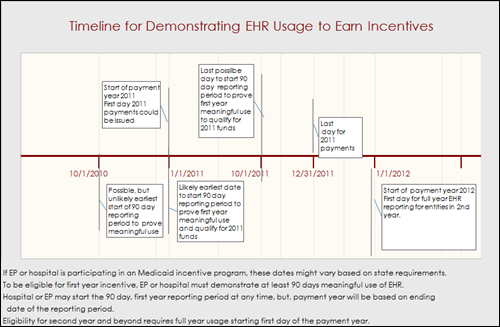The article about Pediatric Associates in CA has a nugget with a potentially outsized impact: the implication that VFC vaccines…
News 1/6/10
HERtalk by Inga
In yesterday’s HIStalk Practice I touched on a few nuggets of information about the latest EHR meaningful use recommendations. I might add it is worth a read because there are some points Mr. H and I haven’t seen covered elsewhere. (And while you are there, sign up for the email updates.) One particularly confusing item relates to the timeline for proving meaningful EHR use in order to earn incentive dollars. I tried to summarize a bit on the timeline for getting money, but because it is particularly confusing, I decided a graphic might help. For those that want to follow along at home, this information is found around pages 23 to 31 in the larger, 557-page document. As I interpret things, to qualify for stimulus money during 2011, a hospital or eligible provider (EP) must demonstrate meaningful use of EHR for “any 90-day period within the first payment year.” The earliest possible start date for that 90 day reporting reporting will likely be January 1, 2011. And, the latest day to start a 90-day reporting period and still qualify for 2011 monies is October 1, 2011. After earning incentive money in the first year, entities will be required to prove meaningful EHR use for a full year, starting on January 1, in order to qualify for second year funds. Thus, if an entity qualified any time during 2011, it would have to continue to prove it used its EHR meaningfully from January 1, 2012 to December 31, 2012 in order to qualify for the 2012 incentive funds. And, if the entity doesn’t try to qualify for the first time until sometime in 2012, then it must prove meaningful use for the full year beginning January 1, 2013, to get the second year funds. And so forth. If someone interpreted things differently (or can explain this better), please advise.
athenahealth signs a deal with Caritas Christi Health Care to provide EHR for its 500 employed providers. Caritas, which already uses athenahealth’s RCM service, will also offer athenaclinicals to 1,200 affiliated providers. Caritas also offers its physicians an option for eClinicalworks. Todd Rothenhaus, MD, the CIO for Caritas confirmed with me that Caritas now plan to offer both products.
I was talking EMR with a girlfriend at lunch today (isn’t that what most gal pals do?) and we agreed that we can’t think of any providers that currently enter 80% of their orders themselves. If we thought hard enough we’d probably have come up with a doctor that uses e-prescribing 75% of the time (but we thought of lots of reasons why a patient and provider might prefer the paper prescription.) And, we couldn’t come up with a single small office group that is currently capable of sending patient data electronically to other providers (often times because the receiver can’t accept the data.) The one bright spot is that the recommendations clearly state that “documenting a progress note for each encounter” is not a requirement for proving meaningful use. Otherwise, the mountain is high.
QuadraMed names Thomas J. Dunn senior VP of sales and marketing. Dunn’s a former Eclipsys VP and spent 22 years at SMS/Siemens.
Ridiculously sad, any way you look at it. An unemployed, unmarried 35-year-old mother of nine sues three doctors and two nurses, after she was permanently sterilized against her will. The mom was delivering baby number nine via a planned c-section and and asked for an IUD to be implanted immediately after delivery. Instead, the doctors performed a tubal ligation.
Cerner lands a couple of big deals with Tenet Healthcare and Universal Health Services. Tenet plans to add Cerner applications in 33 new hospitals, bringing the total Tenet/Cerner shops to 47. Universal will take advantage of Cerner’s remote hosting capabilities to implement the product across 24 acute-care hospitals.
Trinity Health (MI) buys 1,200 bundled EHR/EPM software licenses from NextGen. Trinity purchased 400 licenses in 2006 for some of its employed providers but now plans to roll the software out to all employed providers in its network.
Happy 2010, by the way. The ever-generous Mr. H gave me a bit of time off during the holidays, but now I am back at it. Mr. H and I have each waded through pieces of the latest meaningful use documents, in hopes of becoming industry experts. Unfortunately, at least in my case, more wading is required. I was hoping there might be some clarification about what exactly a “certified EHR technology” is. Of course “CCHIT” is never mentioned anywhere, even though it seems a given that CCHIT will be a requirement since they are the only certifying body out there. Why can’t the Secretary or the ONC come right out and say it’s CCHIT 200x for now. That way buyers know what is required and vendors know what they need to do if they want to participate.




